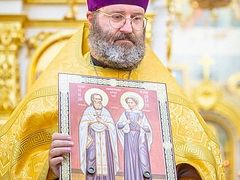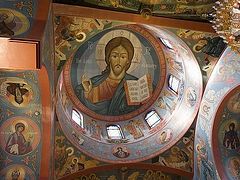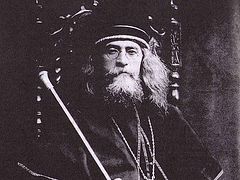Bishop John (Berzins) of Caracas and South America was born and raised in an Orthodox Latvian family in Australia, studied theology in Jordanville, served in the Holy Land, and later began to govern the Edinoverie parishes [the Old Believers who are in communion with the canonical Russian Church.—Trans.] of ROCOR. Now His Eminence carries out his ministry among Orthodox living in South America where there are fewer than twenty ROCOR parishes. We talked about life abroad, Russian emigrants and the preservation of national identity.
 Bishop John (Berzins) of Caracas and South America (center).
Bishop John (Berzins) of Caracas and South America (center).
—You were born to a family of Orthodox Latvians. Has the memory of how your ancestors embraced Orthodoxy been preserved in your family?
—In the nineteenth century there was a popular movement in Latvia and Estonia that was strongly attracted by Orthodoxy. At that time Bishop Irinarch (Popov; 1790—1877) of Riga had jurisdiction over all the Baltic States. It was he who would receive locals into the Orthodox Church. But not everybody was pleased with it—through their contacts in St. Petersburg local German barons hindered this process. They eventually achieved their goal and Bishop Irinarch was removed from the See of Riga! Latvians who converted to Orthodoxy suffered from German barons and were even imprisoned for their faith. But people chose to be baptized Orthodox, and an outstanding figure who much contributed to that was St. Philaret (Gumilevsky), Bishop of Riga (1841–1848) and later Bishop of Chernigov. My ancestors participated in that movement and embraced Orthodoxy.
For example, my grandfather wanted to study at seminary, but he was the wrong age. But a local priest made allowances for him and gave him a fake birth certificate with the required age. The forgery was exposed when my grandfather was already a successful seminarian. He was almost expelled, but thanks to a joint petition by his friends and acquaintances to the Tsar my ancestor continued his studies. The Emperor pardoned my grandfather, though the priest who had helped him was sent to a monastery for two months.
Before their conversion to Orthodoxy my ancestors were Lutherans. But it can’t be said for certain whether or not they were convinced Lutherans. People sought something deeper. Lutheranism didn’t meet their spiritual needs, so they chose Orthodoxy.
—You grew up in Australia. How did you spend your childhood? Did your family live among a Russian-speaking population?
—I can’t say that we lived in a Russian-speaking enclave in Australia. It was a temporary camp in the spot called Island Bend, NSW, in the mountains, where “the Snowy Mountains Scheme” hydroelectricity and irrigation complex (intended as a large system of dams) was being built. It no longer exists. That project was conceived by an engineer of genius who valued refugees. He was aware that there were many well-educated people among refugees whom Australia didn’t appreciate for some reason. He found people with natural talent among the newcomers and used their potential correctly. So there were representatives of various nationalities—including Russians, though not many—among the refugees involved in the construction of the complex.
Of course, there was no church in town. Actually, it was a camp for workers and their families involved in dam building. Every Saturday we would go to Cooma some sixty miles away, where there was the nearest community hall used by the faithful for worship. While my parents went shopping, my granny would take me to services. In time we moved to Cooma. I remember priests coming there twice a month to celebrate services. A Russian priest would come once a month and a Serbian one once a month. There were Russians, Ukrainians, Serbians and others among our believers. We were Latvians.
I understood services very little. My parents spoke Latvian at home. I didn’t know Russian and didn’t study it until my years at seminary.
—So you grew up among both emigrants from the former Russian Empire and the former USSR. Can you share with us how relations between compatriots were formed at that time and compare that to what you see in Russian communities today? What strikes you and what contrasts can you see?
—In my childhood and youth I didn’t know Russian, and therefore I lived by certain ideals. So I can’t draw any comparison. I was born amid emigrants in Australia, then served in America and Europe; however, when it comes to South America, I try to understand what I see here but can’t. It seems people are more involved in politics here… Judging by the autobiography of Archbishop Athanasius (Martos) and other sources, Orthodox hierarchs never lived quietly here. Now there is a split between the ROCOR parishes in Latin America. Thank God, all the venomous and bitter people went into schism. So I am not bothered by secular questions as much as my predecessors were. Now the spirit, the time and the generations are different.
And I can hardly say anything about the spiritual life in Australia in our days. It is hard to draw any parallels between the twenty-first century South America and Australia of the mid-twentieth century.
—What do modern Latin Americans think of Russia? Do they have any knowledge of our country’s history and culture?
—Local people are quite “isolated” in this respect. They barely have any understanding of what goes on outside their continent. “We are far from everything else and live in our own world”—this is approximately what South Americans say. They are open for a dialogue with others and always receive foreigners, refugees and immigrants cordially. But I doubt whether they are interested in the life in Russia, for instance.
Besides, there are linguistic peculiarities in Argentina. Russians are called “Ruso” in Spanish. But when Argentinians say, “Ruso”, they mean a Jewish emigre from Russia because the first emigrants from Russia were Jews who had fled the pogroms (anti-Jewish riots) in Russia in the late nineteenth and early twentieth centuries. So in Argentina you need to give more specific information every time. If you say that you are “Ruso Ortodoxo”—that is, “Russian Orthodox”, they may take you for an Orthodox Jew and a descendant of emigres from the Russian Empire. So, in order to express your identity properly, you need to say “Cristiano Ortodoxo Ruso”—“A Russian Orthodox Christian.”
—Are descendants of Russian emigres in South America well informed about the life in Russia? Have many of them upheld the traditions of their forefathers? Do many of them speak Russian? In what language do you usually communicate with your parishioners?
—Some people are not indifferent. As a rule, these people have preserved the faith and their bond with the Church. Followers of the defrocked Metropolitan Agafangel (Pashkovsky) establish business ties with Russia, their historical motherland, sending their children to Russian schools at the Russian Embassy without recognizing the canonical Russian Orthodox Church.
Russian traditions are upheld in the families of emigres who are linked with the Orthodox Church—that is, they attend services and stick to the faith in their lives. For example, the father of our warden of Buenos Aires Cathedral, Igor Nikolaevich Andrushkevich, graduated from the Russian military school in Serbia. He is a prominent historian, thinker and writer. He truly keeps traditions and continuity alive. There are other people, too. Andrei, his son, is our churchwarden and an activist. His mother is Argentinian, but she became Orthodox and learned to speak Russian.
All depends on your approach. Those who pay attention to the language speak good Russian. I constantly emphasize that I am a Latvian. I do it to prevent others from thinking that all Russians speak like me, with a foreign accent. I speak Russian like a foreigner because I learned it in the emigration. But Russian people of my generation who cherish their language speak Russian as natives. However, the emigres who came in the late Soviet period have acquired the local accent and use Spanish words.
We have few children in our parishes. They speak to each other in Spanish but speak to me in Russian. Of course, I give my sermons in Russian. And everybody has to listen to me, since my Spanish is not very good.
—How many Orthodox Christians are there in South America? How many parishes do you minister to?
—Not many. A tiny minority. The largest local jurisdiction is Antiochean and it’s mostly composed of Syrians, Lebanese, and Palestinians. They have four dioceses in South America, but we have only one. And I can divide the parishes in South America into the living and the half-dead. My diocese consists of only thirteen parishes in South America.
Besides, we are a minority because most parishes in South America went into schism during the process of reconciliation between ROCOR and the Patriarchate. South America is the only place in the world where Agafangel’s schism reached such a scale. I still can’t understand the cause of this tragedy. I feel there is a specific spirit here—not only among Russian-speaking emigres but even among the population. The prevalent idea is that Latin America is a God-forsaken place which is no concern to the rest of the world. Therefore, locals say: “We don’t care about the rest of the world either.” Such is their mentality.
By the way, there is a similar situation with local Orthodox Serbs and Catholics here. Schismatic structures among them are active too.
—Do you do any missionary work? The Catholic Church has a leading role in Latin America. Do you face any problems because of this?
—We just try to preserve what we have and restore what was destroyed. As for missionary activities, they are beyond our strength.
Roman Catholics are a majority in these lands. But Catholics with whom we maintain contact are well disposed to us. Though there are some people who know nothing about Orthodoxy. Catholic priests who have never dealt with Orthodox in their lives have no idea who we are, what we believe in and what values we live by. But in general they are very kind to us. When the future Pope Francis served as Archbishop of Buenos Aires, he was well-disposed to Orthodoxy.
—You also pastor Edinoverie parishes. How did you happen to meet Old Believers?
—It was in the USA when the Pomortsy of Erie, Pennsylvania (representatives of a Bespopovtsy, i.e. “priestless”, denomination of Old Believers), joined the ROCOR in 1983. They would visit Jordanville where I helped them translate liturgical books from Church Slavonic into English. I have always been known as a lover of the Church Typicon. And such people in the Church are usually in sympathy with Old Believers. It was thanks to these two factors that I became close friends with them.
Later, when the Soviet Union collapsed, I served in Jerusalem. There were no barriers anymore, so I would go to Latvia every year. I maintained contacts with Old Believers there, helped them a lot and organized a pilgrimage to the Holy Land for them. But I wasn’t treated very well in the Latvian Orthodox Church; that is why every time I was there I stayed with Old Believers who welcomed me warmly. We shared a common spirit and language with them.
I was also on friendly terms with Bishop Daniel (Alexandrov) of blessed memory. He pastored the Edinoverie parishes in ROCOR. He and I got on well. When the archpastor was sick, I was his assistant. When he reposed, I was put in charge of the Edinoverie parishes.
—Are Old Believers’ communities (I mean all Old Believers living outside Russia) separated from the Russian diaspora?
—In South America, a considerable number of Old Believers live in Bolivia and Brazil. They can also be found in Argentina and Uruguay, though there are fewer of them there. They belong to the Chasovenny (“chapel”) Confession. They moved to this continent from China, and they had previously lived in Russia, in the Altai and Transbaikalia regions. They settled in South America far away from civilization, seeking to preserve their unique identity. I think this position should be respected, so I don’t meddle in their life. Even if I were to try, it is extremely difficult to win their trust! In short, Old Believers in South America lead an isolated and unsociable life far from everybody else. But in Australia they live alongside other representatives of the Russian diaspora. Perhaps it is because they belong to the Popovtsy (i.e., “with priests”) denomination. Many of them have intermarried with mainstream Orthodox. And relations with them are very different.
In the USA, particularly in Oregon, you can find Old Believers of the Chasovenny Confession too. They moved from Brazil in the 1960s, settled in villages, and have lived in seclusion ever since. But, for example, our Old Believers—the community of the Pomortsy of Erie who have joined the Russian Church—uphold their traditions, including the “Naon” znamenny chant, and at the same time are absolutely open to everybody.
—Quite a few Russian people live abroad. They are representatives of very different waves of emigration. Can you say that these people are united by something in the diaspora?
—Russian compatriots are quite united in the Church. As for non-Church people, it can be said that they are atomized. All the waves of emigration were absolutely different.
The first wave took place after the Russian Revolution. It consisted of White guards who were Church people. The second wave was after the Second World War and included refugees and prisoners of war. Germans, for instance, brought many captives as their own slaves. And the first wave accepted the second wave very reluctantly. However, representatives of both waves had something in common—they left their native countries and moved to Argentina against their will.
Our family is a family of refugees. It is difficult to say which wave of emigration we belonged to. But our main attribute was that we always looked towards our motherland in the hope of returning one day and tried to uphold our traditions. The third wave took place in the Soviet era. At that time only Jews were able to leave the USSR. All who managed to trace Jewish roots in their lineage tried to seize this opportunity. There were Orthodox Christians among them. But emigres of that time had a totally different psychology.
The fourth wave began in the post-Soviet period. But these were very different people. They left Russia voluntarily and they are not looking back towards their homeland. They don’t need Russia. It is no wonder that they disregard their native Russian language, and their children will probably not know or understand it.
The war [WW2] was merciless to everybody. The faithful who found themselves in South America did all they could to build their Church life in their new home. But those who are coming today don’t need Church life. They aren’t building churches and they have a different psychology.
—What can you say of the life of the Russian diaspora in Latin America today? What problems does it face? Can you give any good examples of self-organization?
—There are Russian clubs here. They were opened on the initiative of the Russian Government. There are organizations of compatriots and Russian houses. As for us, we are only responsible for the faithful who come to our churches. I don’t think that supporting all the compatriots is our concern. Perhaps this position of ours is explained by the lack of strength to carry out such tasks. Formerly, the Russian Church in emigration was involved in organizing Russian schools instead of catechizing. That is fine, but that is not something the Church should busy itself with. Such spheres as language, culture and identity are not those of the Church; the Church should concern itself with the Gospel.
—In your view, what have Russian people contributed to culture of South American countries over the past century?
—Frankly speaking, we are so few and far between that we can’t have any influence on society. True, there were some emigrants who became famous. But I wouldn’t say there has been any noticeable Russian influence on society and culture of South America…
—What does ROCOR do to consolidate compatriots from Russia and émigré descendants?
—We take Church life on ourselves. A certain number of people come to us. It’s difficult with extra-liturgical life. Buenos Aires, for instance, is a huge city which is even bigger than Moscow. All the parishioners live far from the church and travelling to and from it takes much time. After services we gather and talk, but we have no special programs.
—You mentioned the warden of the Cathedral in Buenos Aires who is a descendant of White emigrants. Can you mention any other bearers of the spirit of pre-revolutionary Russia whom you saw as a bishop? What stuck in your memory and what should we learn from it?
—Their greatest merit is that they preserved the faith. Some of them have preserved their Russianness. Strong traditions bear fruit. In the Andrushkevich family, the Argentinian wife embraced Orthodoxy. Some émigré descendants have preserved the faith. For others, Orthodoxy is merely a part of their identity. They say: “We are Russian, therefore we are Orthodox.” But it can’t be said that faith matters in their lives.
I would give all my parishioners, émigré descendants, as an example. They have preserved their faith despite all the difficulties. They only deserve our respect for that.



